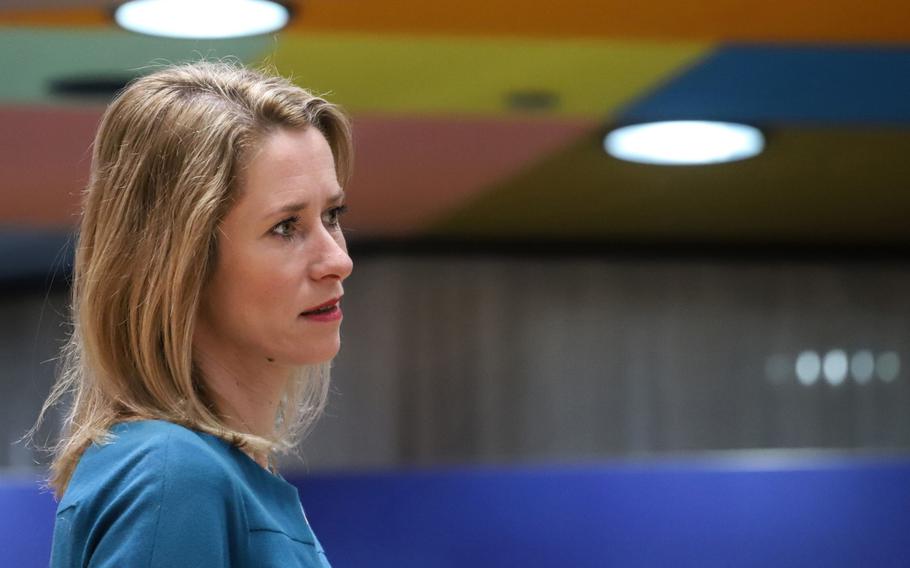
Kaja Kallas, Estonia’s prime minister, at a European Union leaders summit in Brussels on March 25, 2022. (Valeria Mongelli/Bloomberg)
Ukraine’s allies need to accelerate their military assistance and other forms of aid before war fatigue takes hold in the West and Russia makes territorial gains that could become permanent, Estonian Prime Minister Kaja Kallas said.
Kallas, who has emerged as one of Europe’s most outspoken proponents of a robust response to the Russian invasion, said it is vital for Europe and the United States to remain focused on helping Ukraine to win, despite waning public attention on the four-month old war, which now seems set to drag on for many more months.
After Ukraine’s initial success in beating Russian troops back from around the capital Kyiv, Russia has been making slow but steady gains against outgunned Ukrainian forces, who have been appealing to the West for deliveries of more sophisticated weapons to help match Russia’s overwhelming firepower.
Meanwhile, soaring energy prices and rising inflation are emerging as higher priorities in many Western countries than the war, which had consumed public attention earlier in the year, calling into question the commitment of Ukraine’s allies to sustaining support for a potentially protracted war.
Kallas said she is concerned by calls from some European leaders for peace talks, which would risk entrenching Russian gains at a time when it is the Russians that have the upper hand on the battlefield.
“We see the summer coming and war fatigue coming in the Western world. We see calls that this war should be over … which is very worrying for the security situation in Europe,” she said in an interview.
Kallas declined to name any specific countries, but French President Emmanuel Macron and German Chancellor Olaf Sholz have in recent weeks said they would like to see peace talks begin. On the eve of his visit to Kyiv on Thursday, Macron said it was his “wish” that Ukraine wins on the battlefield, adding that eventually negotiations are inevitable.
“I worry that we hear calls for peace negotiations, which very generally means Ukraine should give away some of its territory,” Kallas said. “The big question has to be why Ukraine has to give up territory. Maybe those who want to push them into a peace negotiation should give up their own territories.”
Kallas said her concern is that any peace talks that take place before Russian troops are defeated would entrench Russian gains, handing President Vladimir Putin a win that could embolden him to embark on fresh conquests in the future.
“There are ideas that negotiating some kind of agreement is a way out of this. But Russia will want to get an agreement it never intends to keep. This is what we have seen before,” she said.
Russia’s seizure of Crimea and parts of the Donbas region in 2014-15 and de facto occupation of the separatist territories of South Ossetia and Abkhazia in Georgia in 2008 were met with little international reaction, Kallas noted. If Russia is empowered to keep the areas it has occupied in Ukraine, other parts of Ukraine and perhaps more territories in Europe could follow in the years to come, she said.
“What we have seen before is that Putin will move [further] … to other parts of Ukraine or neighboring territories,” she said. “All these countries and also Ukrainians [couldn’t] live without anxiety about what Russia will do next.”
Kallas acknowledged that Estonia’s tough stance on Russia and the Ukraine war stem to a large degree from Estonia’s own historical experiences, as a country occupied after World War II by the former Soviet Union until its collapse in 1991.
“For France or Germany, the end of World War II meant there was peace, there was rebuilding, people went on with their lives,” Kallas said. “The same peace for us, the people living in occupied territories, the human suffering continued.”
Kallas’s grandparents, great-grandparents and mother, who was 6 months old at the time, were among thousands of Estonians deported to Siberia during the Soviet era. At the same time, the Soviet Union relocated Russians to Estonia, boosting the Russian population of the country from 3.2% in 1922 to 30% by 1991.
Kallas said she sees a similar dynamic underway in the southern Ukraine provinces occupied by the Russians in the first days of the war. Russian forces have been burning Ukrainian books, enforcing the use of Russian language, and last week introduced the Russian curriculum to schools in the Kherson region.
“What they’re doing is the same things we saw in Soviet times … so that Ukrainian culture is erased, the language is erased,” she said.
It’s therefore also important, Kallas said, to accelerate efforts to prosecute Russia for war crimes, which under international law include attempts to suppress language and culture. The International Criminal Court has said it will launch an investigation, but the effort has yet to develop momentum.
The price of moving slowly, whether on weapons or sanctions or war crimes, “goes higher every day,” she said. “It is not only that territories are being destroyed that we have to rebuild. It is not only the lives lost in the war. It is not only the people tortured in the occupied territories.”
“It is also the energy costs for our people, the costs of the war that are affecting all the countries and this will not stop if we don’t stop this war,” she said. “It is in our interest to stop this war as soon as possible and therefore we have to help Ukraine as much as we can.”